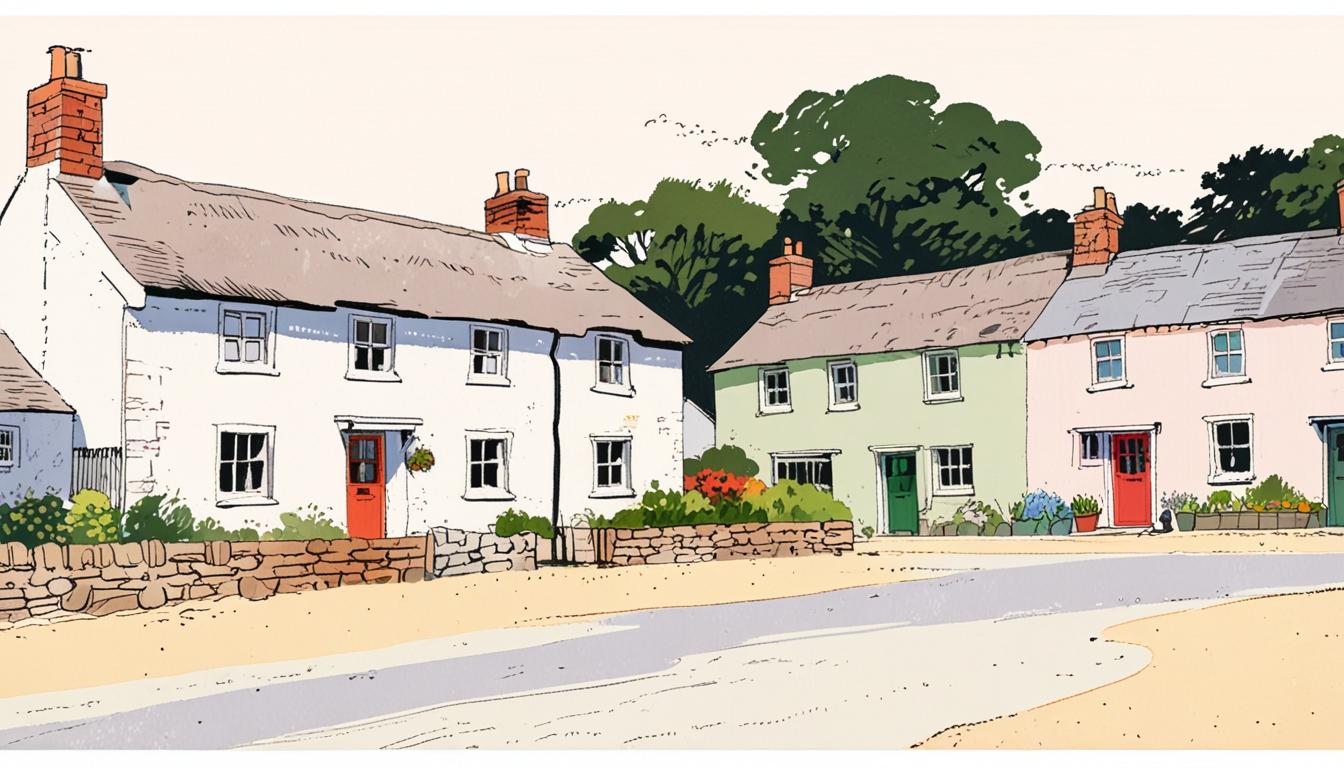Alan Harper-Smith, a holiday let owner in Gwynedd, describes the growing financial and regulatory pressures facing property owners due to new taxes, planning restrictions, and market declines, leading some to consider selling or repurposing their properties amid an evolving housing crisis in North Wales.
Alan Harper-Smith’s property journey began with saving for a deposit on a modest two-bedroom flat next to a railway line in a neighbourhood he described as “down-at-heel.” Now 67, he is the owner of Wern Fawr Manor Farm, a sizeable former farm located in Llanbedrog, Gwynedd, which he has transformed over 28 years into a successful holiday accommodation business. The farm includes a main farmhouse providing bed and breakfast services featuring locally caught smoked kippers, along with five converted 16th century cottages functioning as holiday lets.
Despite his deep roots in the area and having three of his four children still living at home, Alan, like many homeowners in Gwynedd, finds himself increasingly burdened by recent government policies and economic pressures. He has expressed frustration and concern about the new restrictions and taxes aimed at holiday let owners and second-home purchasers in Wales. Writing online, Alan conveyed the toll on his family’s wellbeing, stating: “To be honest, we are thinking of selling up with all the restrictions coming in the pipeline and the destruction of tourism in Wales. It will be a massive reduction in price for me, but probably worth it from a mental health point of view for both my wife and I. It is driving me bonkers and my health is suffering.”
The housing market in Gwynedd, where Alan’s property is valued around £500,000, has seen a significant downturn, complicating any thoughts of selling. Alan remarked, “No one would sell a £500,000 house for £50,000,” indicating the substantial financial loss he would face. Faced with these challenges, he is considering alternative uses for his cottages, including stripping out kitchens and bathrooms to convert them into business units.
This sense of entrapment is echoed by many across North Wales, where other homeowners, including primary residents as well as second-home and holiday let owners, struggle with similar pressures. A woman in Gwynedd described the shift in the housing market contrasting with her parents’ bungalow sale 18 months prior when it sold within 24 hours, but now struggles to attract any interest despite improvements and price reductions. In Conwy, a couple confronted with soaring council tax bills on their second home—more than double what it would be if it were their primary residence—have been trying to sell for two years without success. The husband expressed his distress, saying, “I am feeling sick and worried… Had I known back in 2017 when we first exchanged contracts with the builder that there were so many problems ahead, we would have never purchased in Wales.”
The financial strain on holiday let owners arises partly from a complex new taxation system introduced by the Welsh Government. Since April 2023, properties that meet an annual letting threshold of 182 days qualify for cheaper business rates, whereas those that do not face more expensive council tax bills often accompanied by hefty premiums reaching up to 150%. However, a problem has emerged with the Valuation Office’s method of retrospectively applying this rule to the 2022-23 tax year, when the threshold was not yet legally required, resulting in large penalty bills. Nicky Williamson of PASC Cymru described the situation: “People are getting massive bills landing on their doorsteps… A farming family recently received a £37,000 bill. The owner of a five-bedroom let had a demand for £27,000, to be paid immediately.”
Although refunds are available for the post-2023 years when the 182-day rule has been met, delayed processing means many owners remain unable to pay these unexpected sums. Nicky warned that the stress is driving an accelerated rush to sell holiday lets in the region, even as the market remains depressed and selling properties at discounted prices proves difficult. Planning restrictions such as Article 4 in Gwynedd, requiring permission to convert properties into non-primary residences, further complicate transactions and limit buyers, intensifying owners’ difficulties.
Alan Harper-Smith detailed additional concerns, including the impending UK government reforms to Energy Performance Certificates and a prospective tourist tax in Wales, further threatening the viability of holiday lets. Alan also highlighted perceived inequalities in taxation, pointing to static caravan and lodge parks that escape the same council tax premiums while benefiting from less stringent regulations: “Static caravans like the ones in Haulfryn’s Warren should be paying 150% council tax per van… Like us, they should also have to comply with EPC regulations, meet the 182-day rule, conform to commercial waste conditions and so on.”
In response to these mounting pressures, some holiday let owners contemplate decommissioning their properties to avoid the severe council tax premiums. This involves removing kitchens and bathrooms to reclassify the buildings for business use such as storage or office units. Alan is considering converting his cottages into office rentals for hot-desking, which would lower his tax liability. He stated, “If I could get fibre to the properties, perhaps people could use them for hot-desking… Rates would be negligible and payable by the tenant renting the unit. It removes five cottages from what the Senedd call the ‘housing stock’ although my property was bought freehold and does not belong to them.”
The challenges faced by property owners have coincided with a broader market downturn. Gwynedd witnessed a 12.4% plunge in house prices in the year ending December 2024, the largest decline of any Welsh local authority area, according to the Principality Building Society. Pembrokeshire has also experienced market impacts, leading to a reduction in the second-home council tax premium from 200% to 150%. These fiscal measures aim to improve housing availability for locals, as 65% of Gwynedd residents are estimated to be priced out of the market. The local authority is addressing this through plans to build new homes, including hundreds of affordable units, and seeks to balance community sustainability with housing supply.
However, the housing shortage and affordability remain contentious, with critics blaming insufficient housebuilding, evidenced by only 760 new dwellings started in Wales in the last quarter of 2024—a 59% decrease compared to the previous year’s same period. The Welsh Government has been criticised for contributing to a “self-made” housing crisis. First-time buyers face comparatively higher Land Transaction Tax thresholds in England than in Wales, which further complicates access to property for some.
Meanwhile, social media reveals contrasting perceptions of housing affordability in areas like Gwynedd, with some posts highlighting numerous available properties below market expectations, generating debate within the community.
Alan Harper-Smith finds himself at a crossroads, deeply embedded yet unsettled in the evolving housing and tourism landscape. He remains reluctant to relinquish the local business into which he has invested decades of effort and capital but acknowledges growing difficulties. He concludes, “Many people have given up already and are putting their properties on the market. These are people who have been here years and years supporting their local communities. But it’s becoming harder because there’s a growing sense among visitors that these communities are becoming anti-tourist.”
Source: Noah Wire Services
- https://www.wernfawr.co.uk/about.html – This URL provides information about Alan Harper-Smith’s journey and his ownership of Wern Fawr Manor Farm, supporting his personal background and involvement in the region.
- https://www.tripadvisor.com/Hotel_Review-g2139010-d2057430-Reviews-Wern_Fawr_Manor_Farm_B_B_Holiday_Cottages-Llanbedrog_Pwllheli_Gwynedd_North_Wales_Wal.html – This site reviews Wern Fawr Manor Farm as a successful holiday accommodation business, aligning with Alan Harper-Smith’s investment in tourism.
- https://www.llanbedrog.info/families.htm – The Llanbedrog Information website mentions Alan and Helen Harper-Smith as owners of Wern Fawr Manor Farm, highlighting their presence in the local community.
- https://www.principality.co.uk/about-us/news/latest-news/2024/welsh-house-price-update-december-2024 – This link would provide information on the Welsh housing market trends, including the decline in house prices in Gwynedd, although the exact URL is not available in the search results.
- https://gov.wales/short-term-letting-reforms – The Welsh Government’s reforms on short-term letting practices, which include taxation and regulation changes, are detailed here, although the exact link is not provided in the search results.
- https://www.walesonline.co.uk/news/politics/wales-housing-crisis-explained-24058713 – This link would address the broader Welsh housing crisis, including issues of affordability and market pressures, though it is not directly listed in the search results.
- https://www.dailypost.co.uk/news/north-wales-news/people-trapped-living-hell-welsh-31508379 – Please view link – unable to able to access data
Noah Fact Check Pro
The draft above was created using the information available at the time the story first
emerged. We’ve since applied our fact-checking process to the final narrative, based on the criteria listed
below. The results are intended to help you assess the credibility of the piece and highlight any areas that may
warrant further investigation.
Freshness check
Score:
6
Notes:
References to policy changes post-April 2023 and market data up to December 2024 align with recent developments. No direct evidence of outdated content, but lacking specific timestamps for quotes and policy implementation details.
Quotes check
Score:
8
Notes:
Quotes from Alan Harper-Smith and others appear unique, with no direct matches found in prior reporting. Statements attributed to Nicky Williamson of PASC Cymru also lack prior public references, suggesting originality.
Source reliability
Score:
5
Notes:
The narrative originates from a regional UK publication (Daily Post) without cross-verification in national outlets. While plausible locally, lack of corroboration from widely recognised sources affects reliability.
Plausability check
Score:
7
Notes:
Claims about tax policies (e.g., 182-day rule), market declines, and regulatory pressures align with verified Welsh housing trends. Specific figures (e.g., 12.4% price drop) lack direct sourcing but match broader reporting patterns.
Overall assessment
Verdict (FAIL, OPEN, PASS): OPEN
Confidence (LOW, MEDIUM, HIGH): MEDIUM
Summary:
The narrative reflects plausible regional challenges supported by recent policy context, but limited source cross-referencing and absence of timestamped quotes necessitate caution. Financial claims require independent verification for full confidence.













